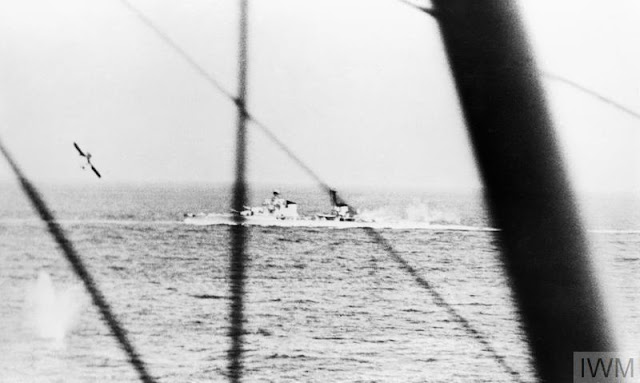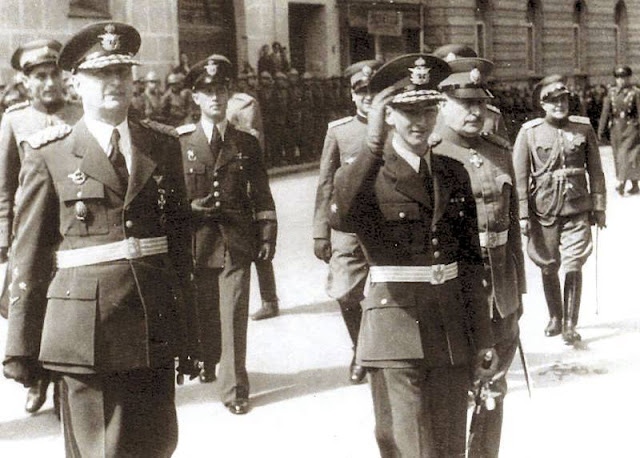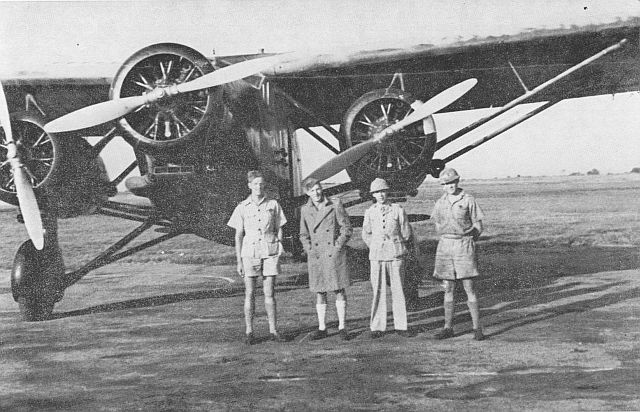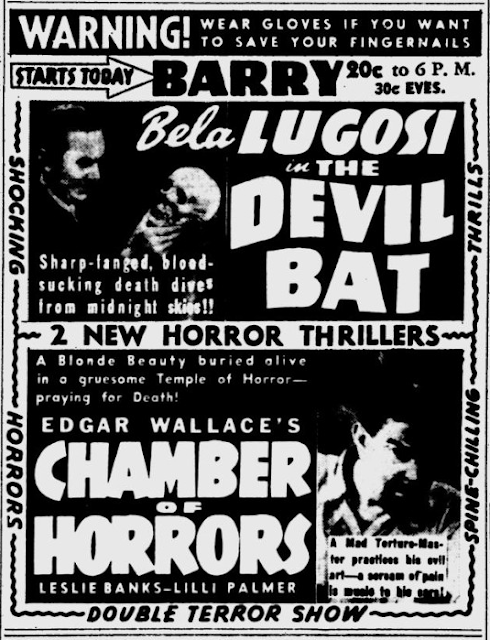Thursday 27 March 1941
 |
| "Lt (A) Clifford's torpedo being released, as seen by Mid (A) Wallington, Observer in the second aircraft." Battle of Cape Matapan, 27 March 1941. © IWM (A 9801). |
Regent Prince Paul is in Zagreb. He immediately returns by train to Belgrade. Upon arrival, he immediately is forced to sign papers abolishing his regency and is sent into exile in Greece. The British want him out of the way, so they send him first to Kenya, then to South Africa to sit out the war.
The rebels surround the royal palace and issue statements over the radio. Public demonstrations break out in Belgrade and elsewhere. Crown Prince Peter II Karađorđević, 17 years old at the time of the coup, is declared to be of age and crowned king. The new government does not outright renounce Prince Paul's signing of the Tripartite Pact, but it refuses to ratify it. Prince Peter - now King Peter - appoints the chief of the air staff, General Dušan Simović, as Prime Minister. Crowds in the street cheer him and demonstrate in favor of the Soviet Union and against Germany.
All of this turmoil and the alien-sounding names leads to some black humor abroad. As recorded by Australian Prime Minister Menzies in his diary, one common joke is "Ah! Robbing Paul to pay Peter!" Another is, "It's hard to tell vitch vitch is vitch."
International reaction is swift and deadly. In London, Prime Minister Winston Churchill piously announces that "Yugoslavia has found its soul" - which reinforces the feeling England was behind the whole thing all along. Menzies notes that "War Cabinet [meeting] more cheerful as a result." He further writes, "we are all wishfully thinking that the tide has turned." It hasn't, at least not yet.
Adolf Hitler sees it somewhat differently. His transient diplomatic coup that he has been working on literally for months disappears overnight, and he is furious. Hitler issues Fuhrer Directive No. 25, the gist of which is obvious from its title: "Plan of Attack on Yugoslavia." It states "my general intention to break into Yugoslavia ... to deal an annihilating blow to the Yugoslav forces." He also obviously has been thinking about gain to be had from taking the country, because he specifically mentions that "seizure of the Bor copper mines [is] important for economic reasons." Operation Marita, the invasion of Greece, is to begin "if possible simultaneously - but in no event earlier." In a preview of coming attractions elsewhere, Hitler vows an "Ohne Gnade," or merciless invasion.
 |
| Belgrade demonstrators, 27 March 1941. |
At Enghiat to the north, the Italians also withdraw during the night, so the Foreign Legion Battalion advances there as well. By the end of the day, it hooks up with the Indian troops advancing past Keren, and they thereby swell their bag of Italian prisoners.
Total casualties at Keren are unclear, but estimates are in the vicinity of 3000 Italian deaths, 4500 other Italian casualties, along with 9000 Eritrean Askari killed and 12,000 wounded. The British, who lost 536 killed and 3229 wounded, have Massawa next on their list, after Asmara. However, the Italians had staked everything on holding Keren and, as elsewhere, once the main blocking position was overcome, there was virtually nothing behind it.
British Middle East Commander General Archibald Wavell has need of the troops which have been tied up at Keren for seven weeks. He orders the 4th Indian Division to move to Port Sudan for transport back to Egypt. Italian defenses in Abyssinia now are irreparably broken.
 |
| Demonstrations in Belgrade, 27 March 1941. |
The Luftwaffe continues its recent pattern of fighter sweeps during the day, with occasional bombs falling in the south and southeast.
After dark, RAF Bomber Command sends 38 bombers against Cologne and 39 bombers against Dusseldorf. Another 13 aircraft attack the usual Channel ports of Brest, Calais, and Dunkirk.
The British in Greenland spot Luftwaffe bombers overhead.
Battle of the Atlantic: U-98 (Kptlt. Robert Gysae) is operating along the convoy routes south of Iceland when it spots 6695-ton British freighter Koranton. The Koranton is a straggler from Convoy SC 25. A torpedo sends the ship down quickly because it is loaded with 8769 tons of pig iron. All 41 men on board perish.
The Luftwaffe bombs and damages 642-ton freighter Meg Merrilies south of St. Govan's Light Vessel (now known as St. Gowan's) in the Bristol Channel off the Pembrokeshire coast, Wales. While the ship is taken in tow, it eventually sinks. Everyone survives.
The Luftwaffe also bombs and damages 430-ton British salvage vessel Palmstone southeast of St. Govan's Light Vessel. The captain beaches the ship at Milford Haven. It later is taken to Pembroke.
The Luftwaffe bombs and damages 396-ton Dutch freighter Oud Beijerland just south of St. Govan's Light Vessel. The ship makes it back to Milford Dock.
The Luftwaffe bombs and damages British depot ship Alecto at the mouth of the English Channel.
The Luftwaffe bombs and damages 212-ton British trawler Fort Dee east of the Faroes Islands.
British 178-ton trawler Kinclaven sinks off the Faroes from unknown causes. There are many mines in the vicinity, and also Luftwaffe attacks near there today.
Dutch 5483-ton freighter Alioth hits a mine and is damaged near the mouth of the Humber. The ship makes it back to Hull.
British cable layer CS Faraday, bombed on the 26th, sinks off Dale, Wales. There are eight deaths.
On U-46 (Kapitänleutnant Engelbert Endrass), Oberleutnant zur See (Lieutenant) Helmut Pöttgen falls overboard and is lost. He likely would have gotten his own command someday, and perhaps become a famous commander. However, because of this incident, Pöttgen never gets a chance to show it.
Convoy OG 57 departs from Liverpool, Convoy HX 117 departs from Halifax.
Royal Navy corvette HMS Burdock (K 126, Lt. Harold G. Chesterman) is commissioned.
Royal Navy destroyer HMS Petard is launched today.
U-563 (Oberleutnant zur See Klaus Bargsten) is commissioned.
 |
| "New Zealand members of the LRDG pause for tea in the Western Desert, 27 March 1941." © IWM (E 2307). |
The Afrika Korps already is feeling the pinch from the movement of Luftwaffe units out of the North African theater. A proposed attack to take the Gialo Oasis (Jalu) to the south is shelved for the time being because it is considered accessible only by air - and no planes are available. In fact, to perform reconnaissance in that direction, the Germans must ask Italian air units to do it.
With Keren finally taken, General Wavell flies back to Cairo from East Africa.
At Malta, the British observe that the Luftwaffe now is maintaining a continuous fighter patrol off the east coast. The RAF scrambles occasionally to confront them, but no interceptions are made. The purpose of this screen is unclear, but it may be to prevent reconnaissance missions over the convoy route from Naples to Tripoli.
British Foreign Minister Anthony Eden and CIGS Sir John Dill continue their unexpected stay in Mala. Dill passes the day by touring military units.
 |
| Demonstrators in Belgrade, 27 March 1941. |
Captain Ellis S. Stone's US Navy Task Group 9.2 completes its visit to Tahiti and proceeds to Pearl Harbor.
German/Italian Relations: Hitler sends Mussolini a letter stating:
I consider it necessary, Duce, that you should reinforce your forces on the Italian/Yugoslav front with all available means and with the utmost speed.German/Hungarian Relations: Hungary suddenly has become much more important in the German order of battle now that Yugoslavia is an enemy. Hitler and Ribbentrop meet with the Hungarian ambassador and remonstrate with him to cooperate in the dismemberment of Yugoslavia. As usual, Hitler offers his "partners" little chunks of the conquests should they help.
German/Bulgarian Relations: Hitler also meets with the Bulgarian ambassador. Bulgaria also has an expanded role to play now that German troops can use it to invade Yugoslavia as well as Greece.
German/Japanese Relations: German Foreign Minister Joachim Ribbentrop finally makes time to meet with visiting Japanese Foreign Minister Yosuke Matsuoka. Matsuoka later meets with Hitler.
 |
| Peter II and Air Force General Dusan Simovic after the 27 March 1941 coup. |
Anglo/US Relations: The British formally lease their naval base at Chaguaramas, Trinidad (off the coast of Venezuela) to the United States for a term of 99 years pursuant to the September 1940 destroyer-for-bases deal. Trinidad takes the base back in 1963.
The Anglo/US "ABC-1" talks that began in January conclude today. There is broad agreement on strategic cooperation should the United States enter the war. Plan ABC-1 posits placing the priority on the defeat of Germany over that of Japan, with a pronounced emphasis on securing the North Atlantic. There will be a combined Chiefs of Staff and US naval protection of convoys. These conclusions are summarized in "The United States British Staff Conversation, Report," 27 March 1941. American participants include Rear Admiral Ghormley and Major General S.D. Embick, while British participants include Rear Admirals Bellairs and Danckwerts and Major General Morris.
Congress approves President Roosevelt's request for $7 billion in Lend-Lease aid. Still fishing off Florida on Presidential yacht USS Potomac, Roosevelt quickly signs it.
Applied Science: The US Army Air Corps sends a B-18 Bolo over the ocean near Cape Cod to test the new centimetric radar system. The plane manages to make the first air-to-air contact by a USAAC plane (the RAF already has done it). It also shows promise for detecting contacts on the ocean, too.
German Military: Hitler indicates that Operation Barbarossa, tentatively scheduled for 15 May 1941, will have to be postponed until mid-June due to the need to invade Yugoslavia and Greece first.
POWs: Up until now, Oflag IV-C camp Colditz Castle has been a POW camp for Polish prisoners. Today, the Germans begin moving the Poles out, sending them to Oflag VII-B in Eichstatt, Germany.
China: The Chinese continue attempting to surround the advance elements of the Japanese Army at the Battle of Shanggkao. However, the Japanese are alert to their peril and stay one step ahead of the Chinese as they retreat back to their bases. This will be a steady retreat that takes some time, but the Japanese have no need to occupy the territory in the area because it serves no strategic purpose if attacks further west are not going to be made.
American Homefront: US General Secretary of the Communist Party Earl Browder begins a four-year prison sentence at Atlanta Federal Penitentiary. He has been convicted of passport fraud.
March 1941
March 1, 1941: Rettungsboje
March 2, 1941: Oath of Kufra
March 3, 1941: Germans in Bulgaria
March 4, 1941: Lofoten Islands Raid
March 5, 1941: Cooperation With Japan
March 6, 1941: Battle of Atlantic
March 7, 1941: Prien Goes Under
March 8, 1941: Cafe de Paris
March 9, 1941: Italian Spring Offensive
March 10, 1941: Humanitarian Aid
March 11, 1941: Lend Lease Becomes Law
March 12, 1941: A New Magna Carta
March 13, 1941: Clydeside Wrecked
March 14, 1941: Leeds Blitz
March 15, 1941: Cruisers Strike!
March 16, 1941: Kretschmer Attacks
March 17, 1941: Happy Time Ends
March 18, 1941: Woolton Pie
March 19, 1941: London Hit Hard
March 20, 1941: Romeo and Juliet
March 21, 1941: Plymouth Blitz
March 22, 1941: Grand Coulee Dam
March 23, 1941: Malta Under Siege
March 24, 1941: Afrika Korps Strikes!
March 25, 1941: Yugoslavia Joins The Party
March 26, 1941: Barchini Esplosivi
March 27, 1941: Belgrade Coup
March 28, 1941: Cape Matapan Battle
March 29, 1941: Lindbergh Rants
March 30, 1941: Commissar Order
March 31, 1941: Cookie Bombs
2020








